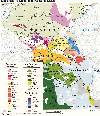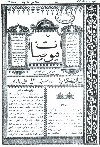 Azeri
is spoken not only in Azerbaijan, but also in Iran. In Azerbaijan it is
the first language of about 6 million people and in Iran is spoken by a
much larger population. The most conservative numbers point to 13 million,
but more realistic estimates indicate about 30 million speakers in Iran.
Azeri speakers live mainly in the northwest part of Iran, also known as
Azerbaijan, usually mentioned as "Southern Azerbaijan".
Smaller numbers of Azeri speakers are also to be found in Dagestan,
Georgia,
Iraq,
Turkey
and Syria.
Azeri
is spoken not only in Azerbaijan, but also in Iran. In Azerbaijan it is
the first language of about 6 million people and in Iran is spoken by a
much larger population. The most conservative numbers point to 13 million,
but more realistic estimates indicate about 30 million speakers in Iran.
Azeri speakers live mainly in the northwest part of Iran, also known as
Azerbaijan, usually mentioned as "Southern Azerbaijan".
Smaller numbers of Azeri speakers are also to be found in Dagestan,
Georgia,
Iraq,
Turkey
and Syria.
Azeri is a Turkic language, belonging to the southern branch of the Altaic language family (therefore non Indo-European). The Azeri language is part of the Oghuz, or Western Turkic, group of Turkic languages, together with Anatolian Turkish (spoken in Turkey) and Turkmen (spoken in Turkmenistan).
The Oghuz tribes of Central Asia spoke this precursor language between the seventh and eleventh centuries. The three descendent languages share common linguistic features. Dialectical differences between Azeri and Anatolian Turkish have been attributed to Mongolian and Turkic influences. Despite these differences, Anatolian Turkish speakers and Azeris can often understand one another if they speak carefully.
Spoken Azeri includes several dialects. Since the nineteenth century, Russian loanwords (particularly technical terms) and grammatical and lexical structures have entered the Azeri language in Russian-controlled Azerbaijan, as have Persian words in Iranian Azerbaijan. The resulting variants remain mutually intelligible, however. Despite these influences the Azeri language maintains several archaic characteristics that are absent from modern Turkish or Turkmen.

Accompanying the Islamization of the Eastern
Caucasus the Arabic script was introduced to the region in the Azerbaijan
region, in the late 7th century. This script continued to be used to write
Azeri until the 1920s. Three different types were used: the 28 letter Arabic
script, the 32 letter Perso-Arabic script and the 33-letter Turkic Arabic
script. None of these very adapted to writing Azeri and several modifications
were attempted. Until the immediate pre-Soviet period, literature in Azerbaijan
was written in these Arabic scripts, in several literary forms that by
1900 were giving way to a more vernacular Azeri Turkish form.
In 1924 Soviet officials pressured the Azeri government into approving the gradual introduction of a modified Roman alphabet, which became known as 'Yanalif' (contraction of 'New alphabet'). Scholars have speculated that this decision was aimed at isolating the Muslim peoples from their Islamic culture, thus reducing the threat of nationalist movements. In the late 1930s, however, Soviet authorities reversed their policy and dictated use of the Cyrillic alphabet, which became official in 1940. Turkey's switch to a modified Roman alphabet in 1928 may have prompted Stalin to reinforce Azerbaijan's isolation from dangerous outside influences by switching to Cyrillic. This change also made it easier for Azeris to learn Russian.
When the Soviet Union disintegrated, the alphabet question arose once again. Iran advocated use of Arabic as part of a campaign to expand the influence of Shia Islam in Azerbaijan. Most Azeri intellectuals ultimately rejected switching to Arabic, however, noting that Iran had not allowed proper study of the Azeri language in northern Iran. Instead, the intellectuals preferred a modified Roman alphabet incorporating symbols for unique Azeri language sounds. In December 1991, the legislature approved a gradual return to a "New Roman" alphabet and on August 2001 the Latin script became mandatory for all official purposes. Azeri speakers in Iran still use the Arabic script.
There are some particularities in the Azeri Latin alphabet, specially the inverted "e" (the 'schwa'), which caused a lot of debate in intellectual and literary circles, not to mention the initial problems for computer implementation. The remaining non standard characters can be found in some other languages, but as a further distinction it should be noted that the the traditional alphabetic order is not respected, with "X" coming after "H" and "Q" after "K". So don't worry, there aren't any pages missing in your Azeri dictionary, they just moved a little! (there's no "W" in the Azeri alphabet.)
This is the full
Azeri Latin alphabet:
If
you are not used to the Azeri alphabet please see the pronunciation
table. See also a basic Azeri vocabulary
for foreigners.
Should you be interested
in reading Azeri sites, downloading Azeri documents or writing your own
texts in Azeri, you'll need to download Azeri
fonts.
Other languages spoken in Azerbaijan:
- Russian (475.000, but decreasing),
- Armenian (200.000, now only in the Nagorno-Karabakh region),
- Lezgin (170.000, northeast - near Daguestan),
- Talysh (130.000, southeast - Lenkoran region),
- Avar (45.000, Zaqatala and Belokany regions),
- Tatar (30.000),
- Tat (22.000, northeast - near Quba - and Baku),
- Tsakhur (15.000, north - near Kas),
- Georgian (14.000),
- Kurd (13.000).
If you wish to further your study of
the Azeri language you may wish to consult the following books:
| Azerbaijani
Dictionary and Phrasebook
Awde, Nicholas and Ismailov, Famil; Caucasus World, 1999 ISBN: 0700706631 Colloquial
Azerbaijani : A Mini Course (with cassette)
Azerbaijani-English
Phrasebook
Basic
Course in Azerbaijani
English-Azerbaijani/Azerbaijani-English
Concise Dictionary
|
Learn Azerbaijani 1
Shikhbabayev, Nusrat; Yusifov, Sabuhi GRBS, 2011 ISBN: 9789952813968 Azerbaijani-English
Dictionary
Azerbaijani-English Dictionary
English-Azerbaijani Dictionary
(pocket
book)
|
note: In English the words 'Azeri' and 'Azerbaijani' are both used as names for the language and people of Azerbaijan.
